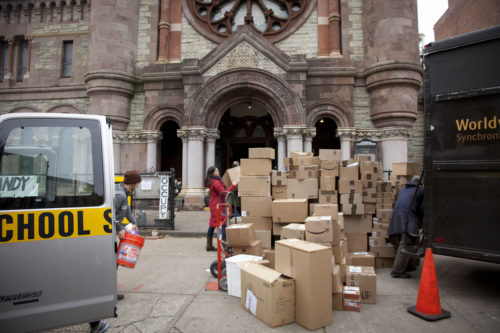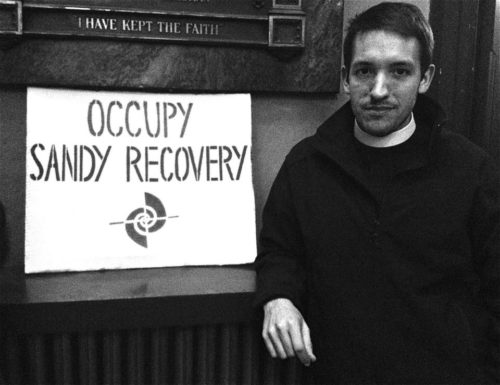Sandy reflections: Churches can help immediately and for long termPosted Oct 29, 2013 |
|

Volunteers unload donated material at the Church of St. Luke and St. Matthew in Brooklyn, New York shortly after Hurricane Sandy. Photo: Church of St. Luke and St. Matthew
Editors’ note: A year ago today, Oct. 29, 2012, Hurricane Sandy set to reeling a large part of the East Coast of the United States. At least 147 people died in the Atlantic basin because of the storm; of that number 72 were killed in the mid-Atlantic and northeastern United States. Sandy caused an estimated $65.7 billion in damage, including destroying or damaging 650,000 homes and damaging hundreds of thousands of businesses. Episcopal News Service invited seven people to reflect on their experience of Sandy, what lessons they and their faith communities learned and what challenges they still face.
[Episcopal News Service] When Hurricane Sandy struck our city, the congregation at St. Luke and St. Matthew in Brooklyn, New York learned quickly that responding by collecting items on Sunday mornings or donating to dedicated relief organizations would not get the immediate help to our neighbors that they so desperately needed. Large relief organizations are slow moving trains. They can be effective over the long-term, but they are not nimble enough to step into the breach immediately. Umbrella relief organizations are not familiar with every local context and geography. However, churches and other faith communities know their contexts well and can step in to help right away.
Churches on the front lines of disasters must be ready and willing to move quickly and partner with anyone in their community who has the necessary skills to help those with critical needs. The Church of St. Luke and St. Matthew was able to gather activists and willing neighbors immediately who were canvassing for needs, providing meals, medications and support within hours of gathering in a church hallway. We heard the same response from storm survivors over and over again, “you are the first people who have come to help us! Thank you!” We learned how essential immediate support is in the aftermath of a storm.
Now that the recovery effort has moved from responding to immediate needs to addressing long-term concerns, St. Luke and St. Matthew is engaging the community partnership model to pilot a range of community health and empowerment ministries. We have partnered with the nursing department of a local university, Americorp, the New York City Department of Health and Lutheran Health Services to launch a health ministry serving the uninsured and underinsured. We provide one-on-one counseling with nurse practitioners, blood pressure checks, free flu shots, HIV testing, health education and more.
We have partnered with Bailey’s Café, a local non-profit that brings together youth and elders around arts programming, to create a community mural on an exterior wall of the church telling the story of Hurricane Sandy recovery, local struggles for justice and a recent fire at the church.
We recently launched a Thursday evening dinner group in partnership with the Paul Robeson Freedom School to bring organizers, teachers, faith leaders and activists from around the world to speak with our community about how to be the change we wish to see in the world.
These partnerships have all grown out of relationships and bonds formed through our Hurricane Sandy relief efforts. They are reminders that Dietrich Bonhoeffer was right, “The church is the church only when it exists for others.”
A continuing challenge to faith communities wishing to respond effectively in times of disaster is deferred maintenance on our own buildings. Many of our churches find themselves in a position to need help rather than offer it after a local storm. In our own case, we did not have adequate bathroom facilities to support the presence of hundreds of volunteers a day. We also have no shower facilities for relief workers from out of town who are in need of a place to wash themselves and rest. We hope to correct these issues over the next few years. Preparing our facilities to serve as host sites for workers and survivors, and preparing our hearts and minds to work with new partners are both essential to an effective local faith-based disaster response.
— The Rev. Michael Sniffen is rector of the Church of St. Luke and St. Matthew, Brooklyn New York.


Social Menu